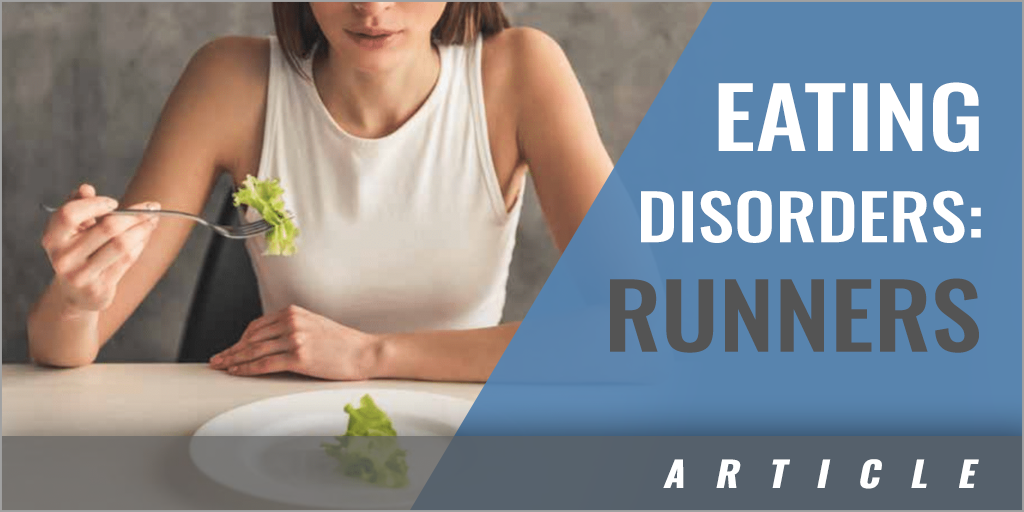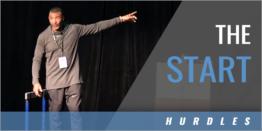|
By: Rachael Steil Originally Published in: Techniques Magazine Provided by: USTFCCCA
In my book, Running in Silence, I describe my struggle with eating disorders as an All-American runner. The following excerpt from the beginning of the book illustrates the level of desperation I reached during my sophomore year of college. The incident occurred in the kitchen of a nearly empty dormitory where I was the guest of a friend: With a butter knife in my hand and the numbers on the scale in my mind, I pulled the crumbs and rock-hard frosting of the frozen birthday cake up to my tongue. And I clawed. I clawed deeper into the cake from my squatting position over the chilly kitchen floor, clawed desperately for any morsel I could chip off the solid block of sugar. All the while the hair on the back of my neck stood up for fear that someone would come by and catch me in the act, for fear that someone would walk into this cold, white kitchen and find good, sweet Rachael sitting before the open door of the freezer as a food thief. I could have waited for the cake to thaw. I could have pulled the cover off the dessert to avoid cutting my wrist as my hand scrabbled beneath the plastic. In fact, you could say that with proper discipline and control, I could have avoided the incident altogether. Only, I had been the epitome of discipline for the past two years. The girl who sneaked into the desolate kitchen that night didn't even recognize herself when she frantically opened all the cabinets and drawers only to find them bare, when she pulled at her face with desperation and want. The girl who had been eating cooked food all day when she seemed so adamant about her raw food lifestyle could barely believe she was now putting not just her purity All-American. I slammed the blunt knife into the stiff icing. School record-holder. Brown cake crumbs scattered every-where. Raw. Food. Runner. I grabbed a chunk of frosting between my shaking fingers, all the while knowing this was not the first time I was putting my newest, greatest running career at stake. I could already imagine the confusion on my parents' faces when I crossed the finish line of the 5k in over 18 minutes; how my teammates would shake their heads and mutter something about "her raw food diet" and the skeptical eyes that would trail up and down my growing body. I feared how upsetting it would be to reveal to everyone the Rachael I had tried to push down for so long, the Rachael my new college friends and coaches never saw because I entered collegiate cross country and track with a body shrunken from my high school one. That body was now equipped with a dark voice whispering its incantations, its reminders of how different I was, how I needed to exert more control because something was broken inside of me. And as I continued to reach for the cake that night, I repeatedly told myself, "This is the last nibble, this is the last piece of frosting." I could feel the walls of the hallway just outside the kitchen closing in on me, tighter and tighter. Someone is coming. They will find you. You will grow bigger. You must stop this. The very air suffocated me, fear electrified my body, and the lights of the small kitchen glared down at me until the butter knife slipped. The knife slipped from my frosting-covered fingers and clanked to the floor. And I jumped, my heart pounding wildly as I wondered who could have heard, who would come running in and how I could possibly explain what I was doing. But the hallway outside the kitchen remained silent. And deciding this was a good chance to escape before anyone did come, I let the freezer door fall shut, slid my foot across the tile floor to remove all evidence of cake-thievery, and dashed back to my room. The dark voice followed. It swept through the hallway with me, clung to my shoulder as I entered the guest room and realized with horror what I had done. Because the moment I entered the bathroom and looked down at the chocolate cake crumbs peppering my outstretched palms, my mind was screaming. Calories. Binger. Thief. I struggled to turn on the faucet, my fingers slipping with frosting residue, but not even the rush of cold water could flood out the voice. I tried to reassure myself that this mistake was fine because it meant I had come to a breaking point, and I promised everything would change from here. But it was a promise I broke over and over that summer. Because even as I vigorously washed my hands, even as I promised again and again that this was the last time, the Rachael deep down burned with a passion, a hunger, a desperation that the raw food diet could not fix. It's a common cycle for many athletes: alternately restricting food and then binge eating. Coaches who are aware of the destruction of disordered eating may only identify red flags when an athlete appears too thin. Other coaches look for extreme leanness as a way to gauge "success" ("race weight," anyone?). But what happens when "race weight" seems to "work" for one sea-son, only to be followed by years of injury, burnout and disordered eating? I fell into this trap as an NAIA All-American runner for Aquinas College. I now coach high school track and cross country and speak around the country about eating disorders in athletes. Having experienced an eating disorder myself was difficult enough, but now I see the tough spot so many of us coaches are in. I realize how little training I've often had to consult with Boston University registered dietitian and leading eating disorders in sport expert Dr. Paula Quatromoni. She provides valuable insight on how best to help athletes by raising awareness and providing education and resources to address this growing problem in athletics. It was through her that I felt I was getting the answers I needed to better meet the needs of my athletes. It was through her that I realized I could help the next generation potentially avoid what I had gone through as an athlete. During my freshman year of college, I watched as my healthy body from high school whittled down to what I deemed "race weight." I lost my period and experienced niggling aches and pains and injuries even through the success of my first year. I spent my days thinking about food and when I could allow myself to eat again— even when I had just finished a meal. I was thin, but not so thin that anyone would think I would be better off in the hospital than on the cross country course. Not every athlete will lose weight when struggling with an eating disorder, but this is how it began for me, as described in Running in Silence: I didn't recognize the shadow that had been growing inside me until a triathlon I raced near the end of that summer. I felt a power, an all-consuming need for achievement and success to make up for something broken within. This power and yearning lurked beneath as I lost weight and saw the results speak for themselves. Suddenly, suddenly, I saw how I could beat other runners in the races I had always wanted to win. I could prove how hard I had worked, how dedicated I was. I could reveal the runner I had always been, just hidden under the additional weight I used to have. I hadn't seen the weight loss in the mirror, but the scale didn't lie. And now the pictures, the races, were the evidence. Now I could see the tendons and muscles emerging from my legs, could see the abs defined more than ever, could see how my ribs shone more prominently through my skin. Look at me. See me. Listen to me. I could beat competitors with ease. I could make my competitors work hard, could make them struggle like I used to as I floated away from them like a ghost. I shocked my high school teammates who heard about my performances at Aquinas College, shocked my high school cross country coach who commented on how "toned" I looked. And I shocked my new college coach. He was proud of my performances, and I felt his excitement. He gave me side-hugs, high-fives, and clapped enthusiastically during my races. I was earning praise at last, and I thrived under it. Never mind the raging hunger. Never mind the daily war with food. This praise ruled over any of that. I hungered for success and love, and I got it all. I thought I had moved past everything after my strong, record-smashing cross country season at Aquinas that fall. I had received an award from Woj, my coach, to recognize not only my achievements as a runner, but more so for my contribution to the team as a person. But something still lingered. I could not walk away unscathed. I walked through the small wooded Aquinas campus thinking about food, continually counting calories, fighting a losing battle with the occasional binges, finding myself hanging over a toilet one night after stuffing myself with pizza. I wondered how much longer I could keep this up as I walked into the cafeteria each morning, wanting nothing more than to eat a large waffle with syrup and peanut butter. If I stayed at a low weight, ran fast, and ate perfectly, I wouldn't have to deal with failure. Little did I know, I could not have been more wrong. A period of restriction (it could be restricting certain food groups, or the amount of food, or both), often leads to binge eating. Those who don't struggle with binge eating may suggest that this problem is "just a lack of discipline." However, athletes who possess all of the discipline, determination and, quite often, drive for perfection to excel in their sport, find themselves in a position where their body fights back to replenish in the form of binge eating: I continually berated myself for the slower times while I fluctuated between bingeing and restricting. The night after the national cross country meet in November, where our team took seventh and individually I took fortieth, I sat holed away in the hotel room shoveling in raw vegetables dipped in peanut butter. Meanwhile, my teammates celebrated together in a room down the hallway. And when I ate through all the food I had bought for my trip with the money provided to each athlete, I sneaked away to the restaurant in the hotel lobby the next morning to eat a large vegetable omelet. I jumped with embarrassment and fear when Woj found me and walked over to chat. I pretended like everything was fine on the trip, but inside I felt alone and trapped in my own body. When I returned home, I finally told my friend Elizabeth the details, and she and my teammate Alina tried to support me as much as possible that winter. I came to them in tears at least one night a week, furious and frustrated with my body. The torment and guilt over bingeing alternated with the euphoria of restriction, and I didn't know how I'd ever get out of it. One of the worst nights involved a bike ride to the campus café where I bought five large granola bars and ate them all in the bathroom stall. And, despite my stomach bursting at the seams, I bought five more and ate those, too. The cravings for this sugar fix had been so intense that I felt powerless to stop it as I ate. My stomach felt like it was ripping with the strain. There was no way to get comfortable. I couldn't even climb back on my bike, let alone walk to my apartment without wanting to shriek in pain. I lay as gingerly as I could on a cushioned bench in the basement of the academic building, frozen with fear that if I moved in just the wrong way, my stomach would tear. The jacket I had won from a huge NAIA race my freshman year, a jacket I had worn like a dress at my lowest weight, now stretched against my protruding stomach as I prayed to be released from the discomfort. I wondered over and over how I could possibly be bingeing this much when I ate protein and vegetables, everything I thought would fill me up more than just fruit. I tried to stick to Trina's meal plan, but I always ate more than the meal plan outlined, which led to terrible guilt. I felt ashamed of almost everything. I had no way of knowing that my body had grown afraid of starving and was protecting itself in the only way it knew. The body has its own wisdom and will fight to survive. And so my body fed itself. I continually tried to fight back as I worked with Jennifer, my eating disorder therapist, and Trina, my eating disorder dietitian. At this point, I was bingeing so much that even when I thought about going back to a raw or fruitarian diet, I knew that the cravings would be unbearable. I couldn't even stick to a "normal" diet. After a year of bingeing, injuries, weight gain, strained relationships and declining performances, I finally confessed to my coach what I was going through in an email. He asked to meet in person to discuss what I had written in my email message to him: "I honestly think you look so much better now," he said. "I look back at those pictures of you as a freshman and just don't see ‘healthy.' I think you can accomplish a lot more with this new body. It may take some time, but your health is more important." I nodded. But I couldn't shake the fear that Woj would now see me differently, even consider me a danger to the team because I might end up giving someone the idea that they could lose weight to run faster. After all, I thought, once anyone knew the "secret," wouldn't they go for it? As if he had read my thoughts, Woj reminded me about the time I had taken care of his baby daughter. "I trust you with her!" He seemed to say that if he trusted me around his kid, he trusted me to be a good influence on the team. Woj also reminded me that this didn't make me a bad person. He told me that I still mattered, that times were not the most important part of being a runner. No matter what happened in the upcoming season, I would still be the Rachael he had asked to join the team. "I'm just scared I won't run as fast as I did my freshman year," I admitted, choking back tears. Woj looked at me for a moment, his eyes gentle. "You don't have to." While some athletes or coaches might infer that this conversation with my coach suggests we should just all be fine with running slower for the sake of our mental health, I interpret this exchange through a different lens. I feel that if I had been in a better spot mentally and nutritionally, I would have experienced gradual success over many years of my collegiate career, rather than one year of success followed by so many years of destruction. My coach's "permission" to take the pressure off myself reduced the desire to try to lose weight, which allowed me to resist engaging in more destructive eating behaviors. He gave me permission to be better Now, as a coach, I believe there are key factors in avoiding these pitfalls that, in the end, break down more runners than they build up. That includes nutrition education led by a sports dietitian and finding one's value and worth beyond running times and performances. While I know place and time are important factors in athletics, we can't consistently perform well if we aren't treating our mind and bodies well. More than anything, coaches need to understand the prevalence of eating dis-orders, other warning signs to look for beyond weight changes, and how to help their athletes get the professional help they deserve. In my experience, red flags included obsessively tracking what and how much I ate, avoiding particular food groups, social isolation, constantly feeling As much as I knew about eating disorders from my own experience, I had a lot to learn as a high school coach. And as much as I initially thought I was one of a few athletes dealing with this, I soon found out how many others were running in silence, too. Education around these issues, more often than not, will lead to authentic long-term success. RACHAEL STEIL IS AN EATING DISORDER RECOVERY ADVOCATE AND THE AUTHOR OF RUNNING IN SILENCE: MY DRIVE FOR PERFECTION AND THE EATING DISORDER THAT FED IT. SHE IS ALSO THE FOUNDER AND SPEAKER FOR THE RUNNING IN SILENCE TO BREAK MISCONCEPTIONS AND RAISE AWARENESS FOR EATING DISORDERS IN SPORTS, SERVES ON THE BOARD FOR THE MICHIGAN EATING DISORDER ALLIANCE (MIEDA), AND IS CURRENTLY A MENTOR FOR THE USTFCCCA FEMALE COACHES MENTORSHIP PROGRAM. RACHAEL HAS DELIVERED PRESENTATIONS AT COACHING CLINICS, HIGH SCHOOLS, AND COLLEGES ACROSS THE COUNTRY TO SHARE HER STORY, CREATE AWARENESS, AND BRING HOPE TO OTHER COACHES AND ATHLETES. YOU CAN LEARN MORE ABOUT THESE PRESENTATIONS AT RUNNINGINSILENCE.ORG/SPEAKING. |







